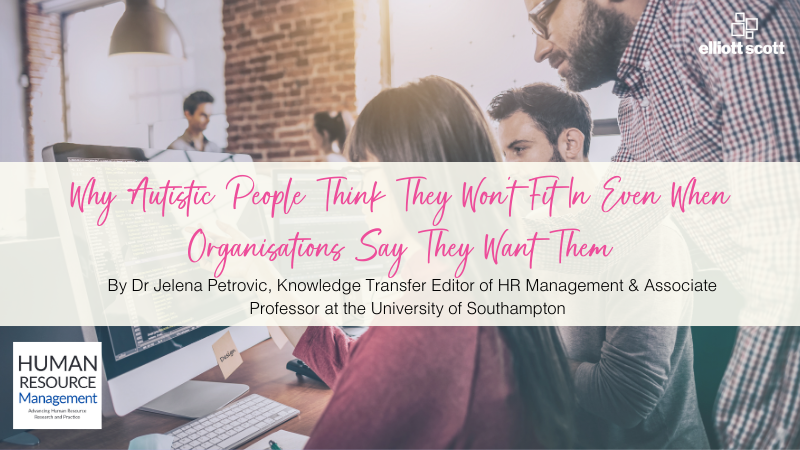Drop off your CV
We serve the global HR community through our offices located in Delhi, Hong Kong, London, New York, São Paulo and Singapore and have placed HR leaders in over 30 countries.
Many autistic people do not want to disclose their autism diagnosis, so what can organisatio...

Many autistic people do not want to disclose their autism diagnosis, so what can organisations do to attract autistic candidates without putting the onus on the candidate to disclose that they are autistic? Saying that you are interested in recruiting autistic people is not particularly helpful unless it is also accompanied by autistic-friendly benefits, but even that does not always work as it depends on autism meta-stereotypes - how autistic people believe other people perceive them, a new study found.
Despite the high number of autistic individuals in the world (approximately 1% of the world’s population is diagnosed with autism spectrum disorders), relatively little research has examined the workplace experiences of autistic people. The studies that do look at autistic employees tend to focus on encouraging them to disclose their autism diagnosis. However, according to a study published recently in Human Resource Management (HRM), many autistic people do not want to disclose their autism diagnosis because they may encounter discrimination.
“Historically, if you look at the research, there's very little research on autistic employees that's been done in the HR community. There's a little bit more in developmental psychology, but within the HR community, a lot of the research on autistic candidates, particularly in recruiting, focused on the assumption that we should be trying to get autistic people to disclose their autism diagnosis in order to get accommodations… We wanted to look for other theoretical ways to encourage more research on autistic people and focus on how we can help organisations attract autistic candidates without putting the onus on the candidate to disclose that they're autistic”, said Caren Goldberg, the lead author of the study and a Marie Skłodowska Curie Research Fellow at the Universidad de Sevilla, Spain.
The study found that saying that they are actively interested in recruiting autistic people does not particularly help organisations attract autistic applicants unless this is also accompanied by autistic-friendly benefits.
“If the organisation offers that in tandem with the opportunity to work from home, that adds an extra bit of information to the autistic candidate that says, “Not only do they say they want to recruit autistic people, but also they are providing accommodations that would be useful to me so that I could do my job to the best of my ability””, said Goldberg.
The study looked at work-from-home opportunities because that is what autistic people said would be most important to them in a focus group.
“When we combined specifically-worded diversity statements that said, “We do not discriminate with respect to physical or mental disability” with offering work-from-home opportunities, that resulted in the most favourable perceptions among autistic applicants in terms of how well they would fit in, and then, ultimately, in terms of whether they would be likely to apply for a job at the organisation”, said Goldberg.
In addition, the study examined meta-stereotypes (the beliefs that a marginalised/stigmatised group has about how other people outside this group see them) and the combined effect of the meta-stereotypes and organisational efforts on the attraction of autistic applicants.
“Autistic people know what it’s like to be autistic, but they also have clear views on how neurotypical people view autistic people. Some autistic people feel that the neurotypical population views them very negatively and some don’t have quite as negative meta-stereotypes”, said Goldberg.
Interestingly, the study found that for people who have extremely negative meta-stereotypes, nothing helps.
“There is a population of autistic candidates that feels that no matter what accommodations are provided by an employer, they are still not going to be able to do their jobs to the best of their ability. We call them effectively the “hopeless people””, said Goldberg.
Goldberg’s co-author was Evan Willham, a student of Foreign Languages at George Mason University, USA.
Contact Caren Goldberg at cgoldberg@us.es
Read the full article here.
Written by Jelena Petrovic, Knowledge Transfer Editor of HRM and Associate Professor at the University of Southampton Business School, j.petrovic@soton.ac.uk
HRM is a Financial Times Top 50 Business Journal published by Wiley.